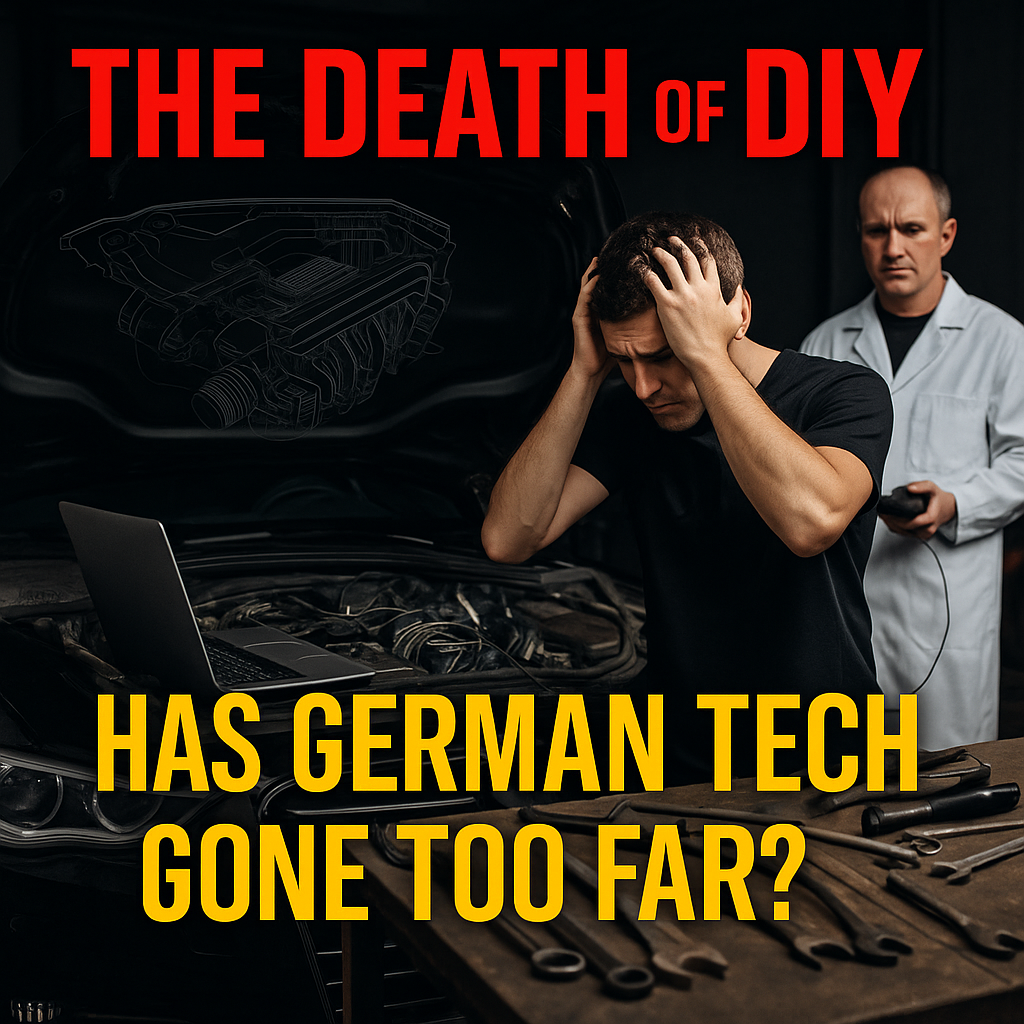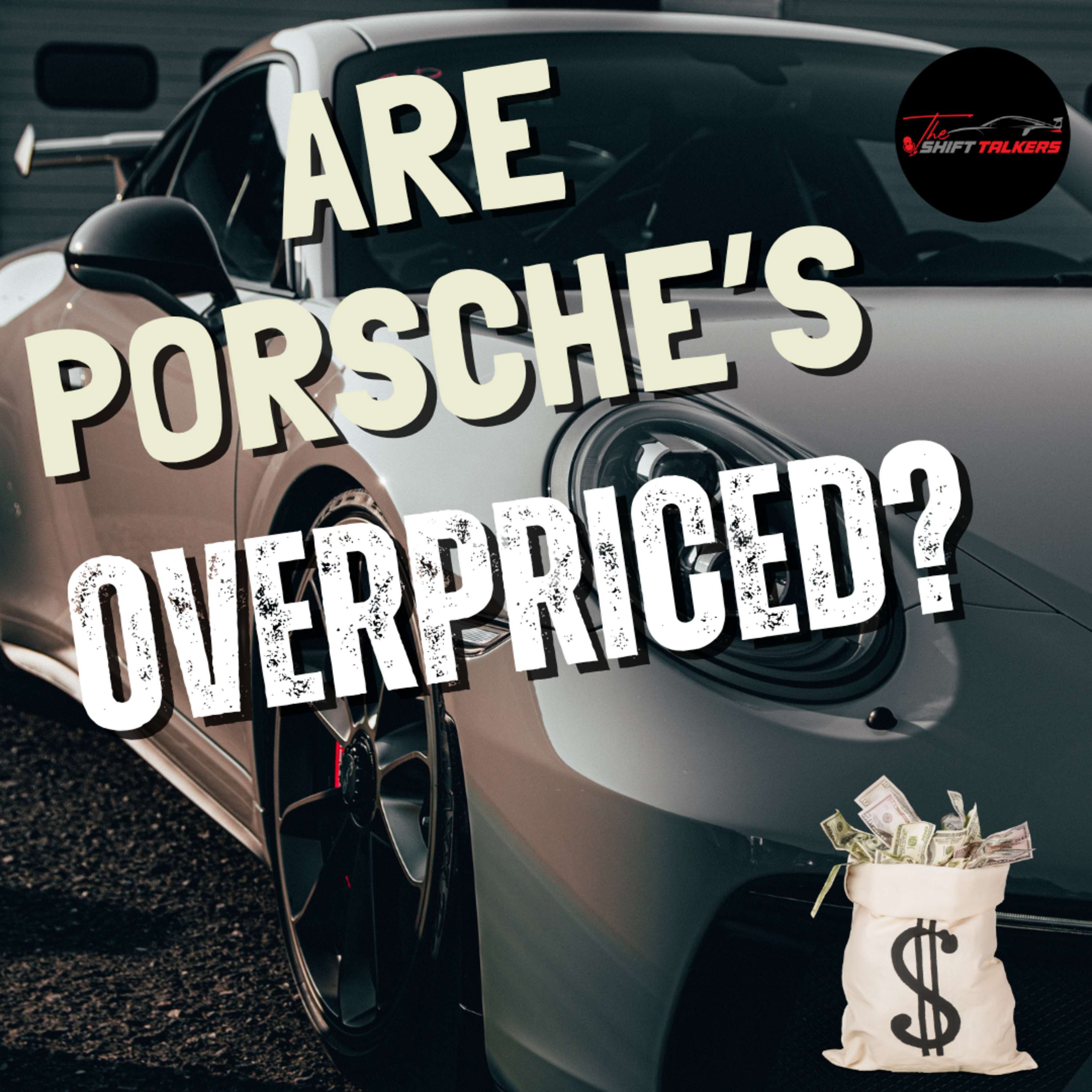The Death of DIY: How Modern German Engineering is Alienating Car Enthusiasts

The Death of DIY: How Modern German Engineering is Alienating Car Enthusiasts
The Shift Talkers dive deep into automotive controversy, pricing debates, and the future of hands-on car culture
The automotive world is at a crossroads. While German manufacturers continue to push the boundaries of technology and performance, a growing number of enthusiasts are asking a crucial question: Are we losing the soul of car culture in the process?
In the latest episode of The Shift Talkers podcast, hosts Franco, Tony, James, and Ferlan tackle this divisive topic head-on, sparking heated debates about everything from Porsche pricing to the accessibility of modern car modification. What emerges is a fascinating portrait of an automotive landscape caught between innovation and tradition.
The Coding Nightmare: When Cars Become Computers
"When I was younger, it was so much easier to work on a car," Franco reflects, echoing a sentiment shared by countless automotive enthusiasts. "You wanted to change a tail light, headlight, or whatever—just a bulb. Just anything. I felt like it was so much easier."
The numbers tell a sobering story. Today's BMW owners face a $1,200 battery replacement that requires specialized coding equipment. Porsche owners need PIWIS systems just to perform basic maintenance. What was once a weekend garage project now demands professional-grade diagnostic tools that can cost upwards of $5,000.
The Hidden Costs of Modern Engineering
James shares his frustration with the current state of German automotive technology: "You change a BCM [Body Control Module] and it has to be programmed to that car. You can't just take a used BCM out of a car, put it in another one because then it throws a fit."
This shift represents more than mere inconvenience—it's fundamentally altering who can participate in car culture. The DIY community that once thrived on accessible modifications and repairs is being systematically priced out by complexity.
The Great Porsche Pricing Debate
Perhaps no moment in the episode generates more heat than Franco's controversial stance on Porsche pricing. "I'm gonna say something controversial," he declares. "Porsches are overpriced. I have one and I think they're overpriced."
His target? The 992 Carrera's $140,000 starting price for what he considers an "entry-level" sports car with only 388 horsepower. "I'm spending $100,000 plus on a car, I want to see over 400 horsepower," Franco argues. "Being in the threes is like being in the early 2000s."
Value Proposition Under Scrutiny
The hosts compare the base Carrera unfavorably to competitors like the BMW G80 M3, which offers:
- All-wheel drive capability
- 500+ horsepower
- Advanced driver assistance features
- Laser headlights
- Competitive pricing in the $90,000 range
Tony defends Porsche's pricing strategy, citing new technology like electric turbos and the brand's racing heritage. However, even he acknowledges that "after COVID, things started to change dramatically in a way that some of the cars are overvalued."
The $100,000 Question: What Would You Buy?
When challenged to spend exactly $100,000 on a performance car, the hosts reveal fascinating insights into current market values and personal preferences:
Tony's Pick: A 991.1 Porsche 911 base model, citing the generation's overlooked value proposition
Franco's Choice: Initially a BMW G80 M3, though he later reconsiders given the pricing dynamics
Alternative Considerations:
- Ferrari 458 (available in the $150-160k range just months ago)
- Lamborghini Gallardo (2008 models with 18k miles at exactly $100k)
- Porsche GT4 (emerging as a consensus favorite)
Budget Performance: The $30,000 Challenge
Recognizing that supercars aren't accessible to everyone, the hosts pivot to more attainable performance options under $30,000, with one crucial restriction: no German cars allowed.
Top Picks for Budget Enthusiasts
Ferlan's Choice: Nissan 370Z - "I'd slam it and tune it"
Franco's Selection: Honda Civic Type R (though slightly over budget when new)
Tony's Recommendation: Subaru WRX STI, despite reliability concerns
Dark Horse Options:
- Toyota Supra (new generation potentially available used)
- Honda S2000 (classic enthusiast favorite)
- Mitsubishi Evo (for those seeking rally-bred performance)
The Stance Culture Divide
The conversation takes an interesting turn when discussing stance culture and extreme modifications. While some view heavily modified, lowered vehicles as automotive art, others see them as functionality-destroying exercises in style over substance.
"Do you feel like they ruined the car?" Franco asks, addressing the elephant in the room about stance culture's impact on vehicle dynamics.
The hosts ultimately land on a diplomatic stance: different communities express their automotive passion in different ways, and there's room for both track-focused modifications and show-oriented builds.
Looking Forward: The Future of Automotive Enthusiasm
Several key themes emerge from this episode that speak to broader trends in automotive culture:
- Accessibility Crisis
Modern cars are becoming increasingly difficult and expensive to modify, potentially shutting out younger enthusiasts and those without significant disposable income.
- Value Inflation
Post-COVID pricing has fundamentally altered what constitutes "good value" in the performance car market, with many traditional benchmarks no longer applicable.
- Technology vs. Soul
While modern cars offer unprecedented performance and capability, they're losing the tactile, accessible character that drew many to automotive enthusiasm in the first place.
- Generational Divide
Older enthusiasts who grew up with simpler cars are struggling to adapt to the complexity of modern vehicles, while younger enthusiasts may never experience the pure mechanical connection of earlier generations.
The Bottom Line
The Shift Talkers' latest episode captures a pivotal moment in automotive culture. As manufacturers push toward electrification and increased technological complexity, the traditional enthusiast community faces an existential question: adapt or be left behind.
Franco's controversial Porsche take, while provocative, reflects a genuine concern about pricing accessibility. Tony's defense of German engineering highlights the real technological advances that justify some cost increases. James and Ferlan's perspectives provide grounding in real-world ownership experiences.
Perhaps most importantly, their budget car discussion proves that automotive enthusiasm doesn't require six-figure budgets—it requires passion, creativity, and community.
As the automotive world continues evolving at breakneck speed, conversations like these become increasingly valuable. They remind us that behind every specification sheet and price tag is a community of people who simply love cars—and that's worth preserving, regardless of how complicated the cars themselves become.
Want to join the conversation? Listen to the full episode and share your thoughts on social media using #TheShiftTalkers. Do you agree with Franco's Porsche pricing stance? What would you buy with $100k? Let the hosts know—they love hearing from fellow enthusiasts.
Tags: #AutomotiveIndustry #GermanCars #PorschePricing #DIYCulture #CarEnthusiasts



